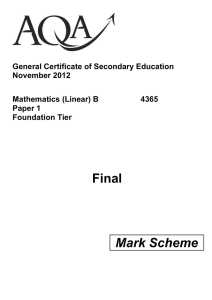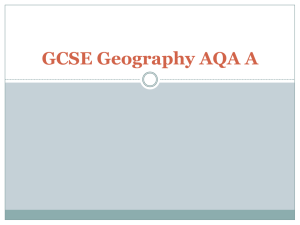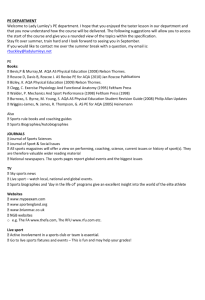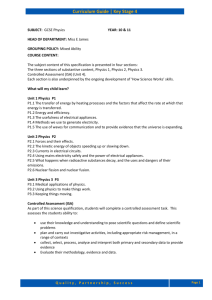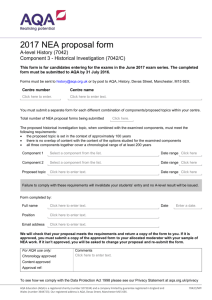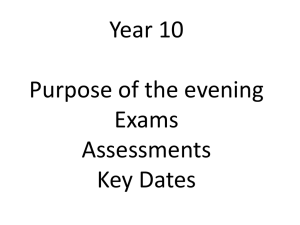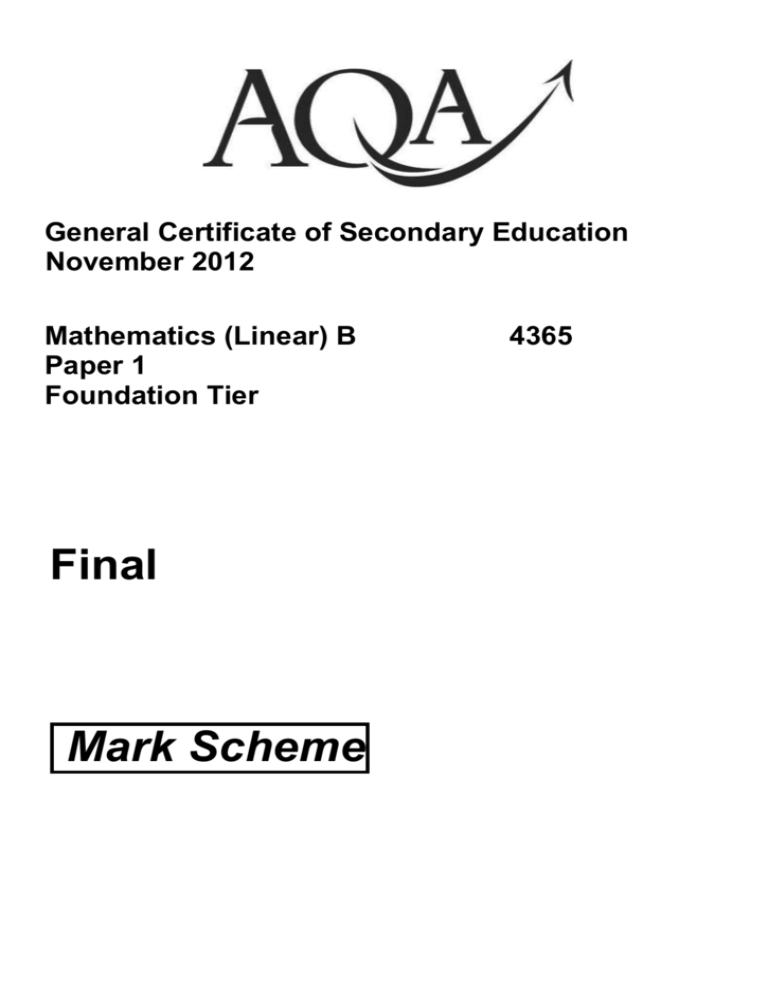
General Certificate of Secondary Education
November 2012
Mathematics (Linear) B
Paper 1
Foundation Tier
Final
Mark Scheme
4365
Mark schemes are prepared by the Principal Examiner and considered, together with the relevant questions,
by a panel of subject teachers. This mark scheme includes any amendments made at the standardisation
meeting attended by all examiners and is the scheme which was used by them in this examination. The
standardisation meeting ensures that the mark scheme covers the candidates’ responses to questions and
that every examiner understands and applies it in the same correct way. As preparation for the standardisation
meeting each examiner analyses a number of candidates’ scripts: alternative answers not already covered by
the mark scheme are discussed at the meeting and legislated for. If, after this meeting, examiners encounter
unusual answers which have not been discussed at the meeting they are required to refer these to the Principal
Examiner.
It must be stressed that a mark scheme is a working document, in many cases further developed and expanded
on the basis of candidates’ reactions to a particular paper. Assumptions about future mark schemes on the
basis of one year’s document should be avoided; whilst the guiding principles of assessment remain constant,
details will change, depending on the content of a particular examination paper.
Further copies of this Mark Scheme are available to download from the AQA Website: www.aqa.org.uk
Copyright © 2012 AQA and its licensors. All rights reserved.
COPYRIGHT
AQA retains the copyright on all its publications. However, registered centres for AQA are permitted to copy material from
this booklet for their own internal use, with the following important exception: AQA cannot give permission to centres to
photocopy any material that is acknowledged to a third party even for internal use within the centre.
Set and published by the Assessment and Qualifications Alliance.
The Assessment and Qualifications Alliance (AQA) is a company limited by guarantee registered in England and Wales (company number 3644723) and a registered charity (registered charity number 1073334).
Registered address: AQA, Devas Street, Manchester M15 6EX
Glossary for Mark Schemes
GCSE examinations are marked in such a way as to award positive achievement wherever possible. Thus, for
GCSE Mathematics papers, marks are awarded under various categories.
M
Method marks are awarded for a correct method which could
lead to a correct answer.
M dep
A method mark dependent on a previous method mark being
awarded.
A
Accuracy marks are awarded when following on from a correct
method. It is not necessary to always see the method. This can
be implied.
B
Marks awarded independent of method.
B dep
A mark that can only be awarded if a previous independent mark
has been awarded.
Q
Marks awarded for quality of written communication. (QWC)
ft
Follow through marks. Marks awarded following a mistake in an
earlier step.
SC
Special case. Marks awarded within the scheme for a common
misinterpretation which has some mathematical worth.
oe
Or equivalent. Accept answers that are equivalent.
eg, accept 0.5 as well as
[a, b]
Accept values between a and b inclusive.
3
AQA GCSE Mathematics (Linear) - 43651F - November 2012
Paper 1 Foundation Tier
Q
Answer
Mark
1(a)
(1, 6)
B1
1(b)
Mark at (6, 4)
B1
1(c)
2 × their 4 + 2 × their 5 or
Comments
Accept cross, dot etc
Mark must be intended to be on line BC
M1
4 or 5 must be correct
18
A1
SC1 22
2(a)
323
B1
2(b)
155
B1
2(c)
520
B1
2(d)
23
B1
(£) 3.60(p) or 360p in total column
B1
Condone 3.60 but not 360 without units
(£) 1.20(p) or 120p in first column
B1ft
ft their cost of coffees ÷ 3
4(a)
−1
B1
4(b)
175
B1
3
8 + 10
4
AQA GCSE Mathematics (Linear) – 43651F – November 2012
Q
Answer
Mark
5
B3
Comments
B2 any two correct
B1 any one correct
Cuboid
Pyramid
Cylinder
Cube
Triangular
prism
6(a)
12
B1
6(b)
35
B1
6(c)
Men’s bar 16 and Women’s bar 24
B2
B1 for correct height of either bar or for
any two bars that add up to 40 or for any
two bars with a difference of 8 or for 2x +
8 = 40 or 2x – 8 = 40 (oe)
6(d)
(10 + 15 (= 25)) × 5 (= 125)
M1
25 not from incorrect working
Their 125 – 30
M1
19 × 5 is M2
5
AQA GCSE Mathematics (Linear) - 43651F - November 2012
95
A1
7(a)
3
B1
Answer may be seen in Output box if
answer line blank
7(b)
50
B2
B1 for 8 + 2 (= 10)
(may be seen on
diagram) or for their 10 × 5
(may be seen on diagram)
or for reverse diagram or reverse
operations shown in order
SC1 input of 2 or 30 or –0.4
Q
8
Answer
Mark
Comments
20, 20, 10, 5 and 50, 2, 2, 1
B3
9(a)
60(%)
B1
9(b)
8
10
B2
9(c)
70 ÷ 10 × 4
M1
oe
28
A1
SC1 answer of 42 without 28 seen
*10
20
25
800 ÷ 10 (= 80) or 800 ÷ 5
(= 160)
M1
6
B2 50, 5 and 20, 20, 10, 2, 2, 1
B1 for 110 or (£)1.10 or 55 seen
(Could be implied by Ben or Yusaf’s
money totalling 55 p)
B1 for 1 correct answer with at most
1 incorrect answer or for 2
correct and 1 incorrect
oe
AQA GCSE Mathematics (Linear) – 43651F – November 2012
Q
Answer
Mark
Comments
800 ÷ 10 (= 80) and 800 ÷
5 (= 160) or
their tax = 2 × their
insurance
M1
560
A1
Complete method for
finding the money left
Q1
Strand (iii)
Must have gained one M1 and
have subtracted the total of their
two values from 800
M1
oe
Their 0.3 × 800 (= 240)
M1
oe
560
A1
Complete method for
finding the money left
Q1
240 is M2
Alternative method
11
(= 0.3)
+
10 5
Strand (iii)
Must have gained one M1 and
have subtracted the total from 800
11(a)
6a
B1
Accept 6 × a or a × 6 but not a6
*11(b)
6mp
Q1
Strand (i)
Accept 6pm but not with × signs pm6
or mp6 or 6(mp) Q0
12
Adds at least 4 fence sections using
both sizes and gives a total Must
use correct multiples < 36
M2
A1
4 @ 5-feet lengths
2 @ 8-feet lengths
Alternative method 1
7
M1 At least two of
10, 15, 20, 25, 30, 35, 16, 24, 32 Can
use diagrams or tally marks
SC2 20 @ 5-feet and 16 @ 8-feet SC2
885555
AQA GCSE Mathematics (Linear) - 43651F - November 2012
M1
Adds together 5 and 8 (= 13) and
Subtracts multiple(s) of their 13 from
36
eg 36 − 13 (= 23) or 36 − 26 (= 10)
M1dep
Tests the remainder against 5 or 8
times table eg 10 = 2 × 5
A1
4 @ 5-feet lengths
2 @ 8-feet lengths
Alternative method 2
M1
Subtracts a multiple of 8 from 36 and
divides remainder by 5 eg 36 − 8 = 28,
28 ÷ 5
Repeats for a different multiple of 8
M1dep
14
Repeats for a different multiple of 5
A1
4 @ 5-feet lengths
2 @ 8-feet lengths
13
Subtracts a multiple of 5 from 36 and
divides remainder by 8 eg 36 − 5 = 31,
31 ÷ 8
14 and 22 chosen
or
their 22 – their 14 with either correct
M1
8
A1
4 × −2 (+) 3 × 5 or
M1
−8 or 15
7
A1
8
oe
AQA GCSE Mathematics (Linear) - 43651F - November 2012
Q
Answer
Mark
Comments
5x − 15 − 2x + 2
M1
5x − 15 − 2x + 2
A1
A1 if fully correct
3x − 13
A1ft
ft on one error
16(a)
5
B1
16(b)
46
B1
Not 4|6
16(c)
38
B1
Not 3|8
17(a)
64
B1
17(b)
116
B1
17(c)
Corresponding
B1
Any unambiguous indication eg circles
correct word
18(a)
Translation and
B2
B1 Translation
15
7 right, 2 down
7
or
Attempt to expand both brackets to 4 terms
with at least 3 correct
7
y
or 7 right or 7 → or
−2
or
2 down 2 ↓ or
x
2
or
(7, –2)
9
27
or
72
or
AQA GCSE Mathematics (Linear) - 43651F - November 2012
18(b)
B2
B1 for reflection of shape B in x = −1 or
for reflection of shape A in y = −1 or
for reflection of B in the bottom right
quadrant, including reflection in the
x-axis
B1
0
B2
B1
19(a)
Fills in totals on grid for at least 3
correct 9s
M1
9
A1
is A0 even if 9 stated
Alternative method
M1
Identifies 9 as most likely total eg (1, 8),
(2, 7), (7, 2) etc for at least 3 totals
9
19(b)
A1
Fills in 4, 5 or 6 correct totals on grid
for 2, 3, 15 and 16
Denominator of 64 or numerator of 6
M1
Identifies at least 4 of (1, 1), (1, 2), (2, 1),
(7, 8), (8, 7) or (8, 8) with no wrong pairs
Need not be as a bracket eg 1 + 1 Totals
need not be seen
M1
64 choices identified
A1
Any fraction, decimal
percentage equivalent to
Alternative method
×
M1
10
is A0 even if 9 stated
(0.09375)
is M2A1
or
AQA GCSE Mathematics (Linear) – 43651F – November 2012
Q
Answer
6×
Q
20
Mark
×
Answer
Their 16 x = 24
M1
oe
A1
oe
Mark
6x + 2x + 6x + 2x (=16x)
Comments
Comments
M1
M1dep
1.5 (oe) or 9 after 1.5 seen
A1
8x = 12 is M2
oe SC1 14x = 24 leading to x = 24/14 oe
Alternative method
Guess a value and multiplies
correctly by 16
Guesses a second value nearer to
or brackets the correct answer and
multiplies correctly by 16
M1
= 2 gives 32
M1dep
1.5 or 9 after 1.5 seen
21
x = 1 gives 16 x
(Angle ADB =) 90 – 50 (=40) or
(Angle ADB =) 180 – (90 + 50) (=40)
11
A1
oe
M1
May be on diagram
Accept D = 40 or obtuse angle at D marked
or labelled as 140
AQA GCSE Mathematics (Linear) - 43651F - November 2012
(180 – Their CDB) ÷ 2 or
their ADB ÷ 2
M1dep
20
Their CDB must be from 180 – their ADB
Must be complete method
A1
Alternative method
50 + y + y = 90
M1
oe 90 + 50 + y + y = 180
2y = 40
M1
y = (180 – 140) ÷ 2
20
A1
12

